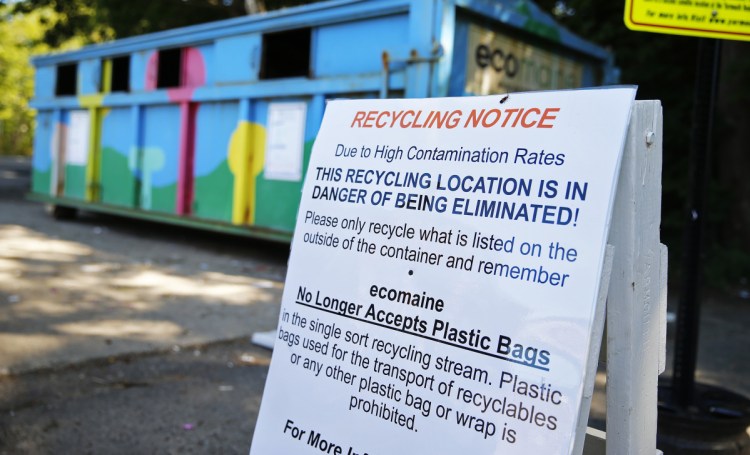There’s a level of self-satisfaction that comes with throwing something in the recycling bin rather than the trash. As it turns out, a lot of the time, it’s not wholly earned.
According to ecomaine, the nonprofit corporation that processes trash and recycling for more than 70 Maine communities, 15 percent of what it receives in recycling cannot be reused. Waste Management, the Houston-based corporation that handles about 15 percent of all U.S. recycling, finds that about a quarter of what it receives cannot be reused.
Sometimes it’s because the recyclable material itself is corrupted, like when paper plates are soaked with grease; other times, it’s because nonrecyclable material has been thrown in the bin – everything from waxed paper and rope to small appliances and construction debris.
And when too much of the wrong stuff arrives in any one truckload, often the whole shipment is sent to the incinerator.
The problem has taken on more urgency as China, which buys most of the world’s recyclables, has raised its standards for what it will accept, destroying the market for dirty recyclables. Whereas ecomaine, which recycles 40,000 tons annually, was previously paid $107 per ton for the material, it must now pay as much as $45 a ton to get rid of it.
It is not just a problem of municipal finances. If China’s policy continues, it will add an estimated 111 million more metric tons of material to landfills worldwide by 2030, and every bin of contaminated recycling adds to that total.
There’s also a larger story here about the sheer amount of disposable, nonrecyclable trash we create, and then hardly think about once it’s picked up each week.
However, right now, the higher costs are hurting ecomaine’s bottom line, and forcing the organization to get tougher with its clients – it has started sending bills to communities for having to process contaminated recyclables.
The crackdown has highlighted a hard truth about recycling: People often don’t put too much thought into what they throw in the recycling bin, particularly when it appears remotely recyclable.
In some cases, confusion is the culprit. It’s easy to assume dirty paper plates are recyclable. The same with plastic bags marked with the recycling triangle, which ecomaine no longer accepts.
And too many items, such as disposable coffee cups, are a mix of paper and plastic, or a mix of two plastics that cannot be recycled together, even though both seem like they should be OK for the blue bin.
The confusion excuse, however, doesn’t hold for the person who drops an old television or computer in the recycling. For that person, the issue is distance: Too many people think the problem is over once the item leaves their sight.
For the confused, the answer is more education, in the hope that residents will take the extra time to properly sort their recycling.
And for those who don’t comply, there are ways to make the message a lot more immediate.
When the city of Sanford was presented with a bill from ecomaine for its contaminated recycling, it began rejecting bins with improper materials. In the first week, the city rejected 250 bins, Public Works Director Matt Hill told the Maine Sunday Telegram. In a recent week, it was down to two.
“Until something is right in front of someone’s face,” Hill said, “it doesn’t really register.”
Send questions/comments to the editors.


